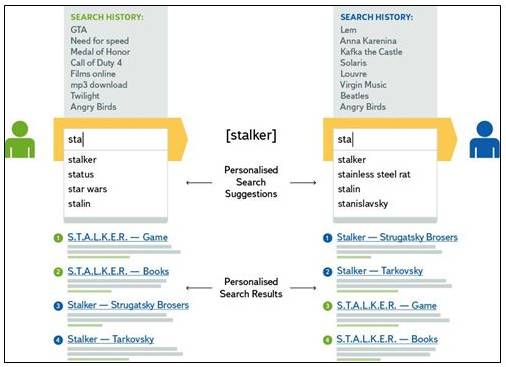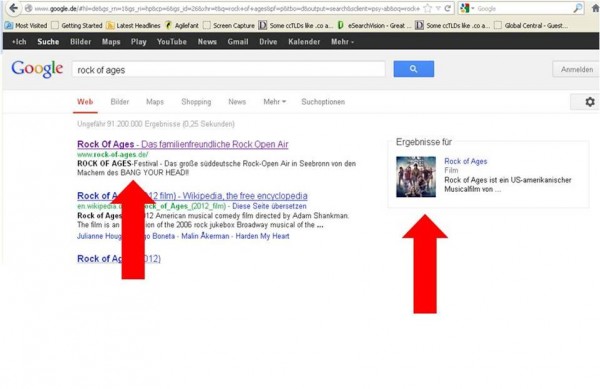Why Is Search Engine Results Personalization A Driver For Using Local Domains Internationally?
Have you seen or read much about what steps we SEOs should take to manage our activities around a world where an increasing personalization of search engine results is an ever present feature? I’ve seen a few things about needing to take less note of rank positions and more of traffic but can’t recall much […]
Have you seen or read much about what steps we SEOs should take to manage our activities around a world where an increasing personalization of search engine results is an ever present feature? I’ve seen a few things about needing to take less note of rank positions and more of traffic but can’t recall much else.
Internationally, personalization is a relatively high risk strategy for search engines. If you’ve attended an International Search Summit, you may have heard me tell stories of high profile marketing failures resulting from new international roll-outs? Those roll-outs were typically organised by expert marketers, so imagine what a computer can do running on automatic?
What Actually Is Personalization?
Nonetheless, all major search engines believe strongly in the importance of personalization. Just recently, we saw Yandex roll-out the feature as you can see here.
What was interesting about Yandex’s announcement was the fact that they pulled back from full personalization because their research showed that users didn’t like that degree of personal search — in other words, Yandex is limiting the scope of its personalization to achieve the best possible user relevance.
Let’s take a quick step back and consider what we mean by personalization so we’re all on the same page. It’s aim is to deliver the most relevant result most closely matching the intent behind the user’s query. There are a number of factors we can take into account to get closer to the user’s intent — particularly for ambiguous queries such as “cruise” which could relate to Tom Cruise or to going on holiday.
What Are The Key Factors Which Enable Search Engines To Personalize?
Firstly, there’s context. If the user searched for “rock of ages” just immediately prior to a search for “cruise”, it’s more likely they’re looking for Tom Cruise the actor as he was a star of the movie of that name. This is used much more than many realise to get closer to the user’s intent — and is another case where ranking checks can be misleading.
Then, there’s the personal connections or social network side of personalization, which is the background to seeing the images of people you know in the SERPS. Search engines are using social shares from Facebook, Twitter, Google+ and other social sharing tools to help them discover new content and to show what they think might be relevant links for their connections.

Yandex Explains How They Use Context To Help Decide Which Results Are Most Relevant For “Stalker” Source: Yandex
Your history, of course, is a relevant factor because that’s connected to what you do directly. Although, a popular bookseller I could name insists on offering me Harry Potter books although I am not a fan but bought a copy as a gift some time ago!
And finally, there’s the aspect of “location” of where you are which is becoming more relevant and more precise partly because of the increasing use of mobiles or tablets to access the web.
Internationally, How Are The Personalization Factors Relevant?
All of the personalization factors help search engines to perform internationally — each in their own way. Context, for example, works just as well in any language but across language too. This is particularly important when searchers are using international or “English” queries when that isn’t necessarily the language they would like to receive their results in.
For instance, if you’re in Germany and you searched for “Rock Of Ages” you might actually mean “Das große süddeutsche Rock-Open Air in Seebronn” — in other words the rock concert in Seebronn due to take place in July this year, rather than the great Hollywood movie with Tom Cruise. But if you searched for Tom Cruise just before this search, you help search engines understand you actually really did mean the movie!

“Rock Of Ages” Could Be A Search For A Movie Or A Rock Concert If You’re German. Source: Google
Unless you’re an odd type of person (in other words, like me), most of your friends and social network connections probably exist in and around your local area with some scattered a bit further afield and then some in other countries. Your social connections are something of a lens that helps information retrieval engines to recognise where you are and that if you’re in need of a pizza, then home delivery from Chicago is not going to help you in Barcelona.
Your history will typically reflect where you are too as well as giving clues as to your interests.
And your location, which may be indicated by the triangulation of your mobile antenna even more so than your IP address, can have a particularly significant impact on the results you see.
Funnily Enough, People Still Prefer To Buy Locally?
In the context of all of the above, one thing is becoming really clear to me in all the results I’m seeing from around the world. The local domain or ccTLD is currently growing in impact and performance — not declining as some have said; it seems that personalization is one of the drivers for this factor.
You see, however you look at the world, people buy from people they know and they buy locally — at least in the first instance. They click on local domains from choice above generics as focus group research by Webcertain showed last year. In that research, we discovered that users read domains before clicking, they click on brands they recognize, on more local domains if they can get them and they share local sites with people they know because they don’t want to send their friends on wild goose chases.
And after all, people are the new algorithm we should all be chasing.
Opinions expressed in this article are those of the guest author and not necessarily Search Engine Land. Staff authors are listed here.
Related stories